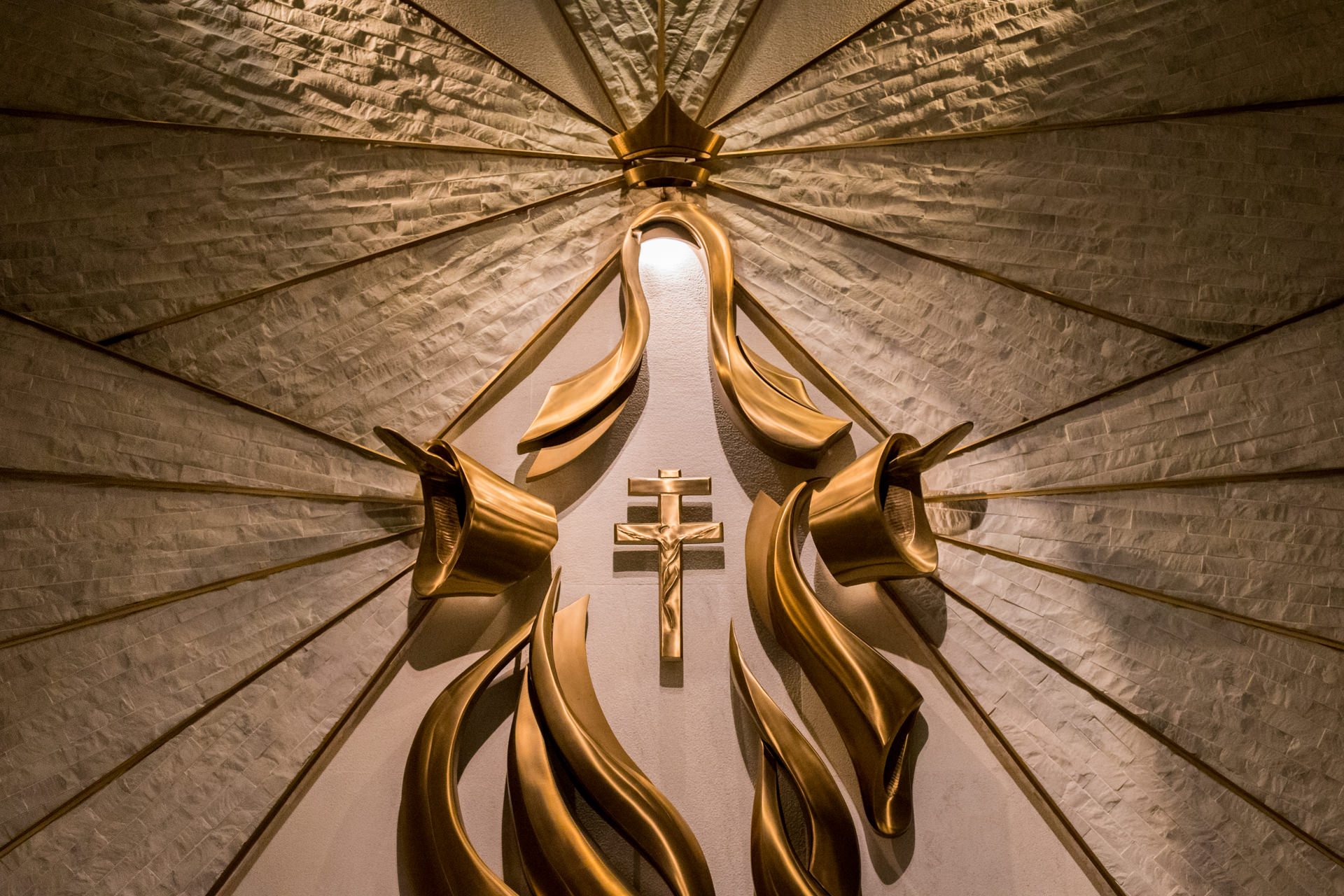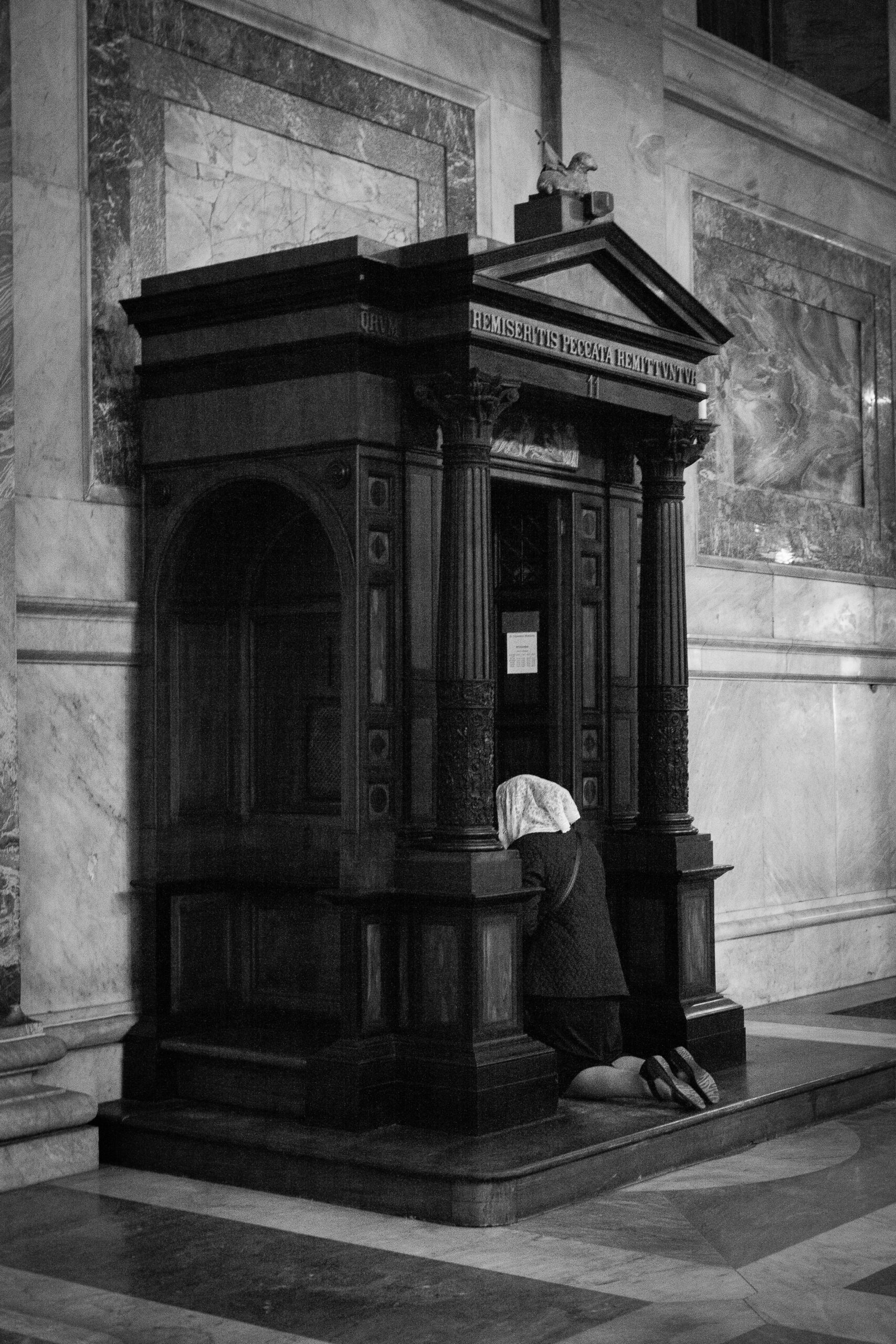Jesus asked His disciples, “Who do people say that the Son of Man is?” The answers varied from a prophet to John the Baptist. He then asks the question each of us should carefully contemplate our answer to, “But who do you yourselves say that I am?”
Who is Jesus in your life? Simon Peter knows He is “the Christ, the Son of the living God.” Remarkably not by the words of man but through God—from heaven above. For this proclamation, Jesus responds to Peter, “Blessed are you.” In the Scriptures, we meet others, who were likewise referred to as blessed for believing the revelations of God. At the Visitation, Elizabeth cries out to Mary, “blessed is she who believed that there would be a fulfillment of what had been spoken to her by the Lord.”
To the no longer doubting Thomas, Jesus says, “Blessed are they who did not see, and yet believed.” There seems to be a pattern emerging of how one becomes blessed. It is not through some heroic deed but through faith—the kind that comes from the heart and not through the eyes. I long to be known as blessed, to imitate the trust exemplified in Mary, Peter and Thomas, not superhuman actions but acts of incredible faith.
The author of Hebrews illuminates the meaning of faith, writing, “Now faith is the certainty of things hoped for, a proof of things not seen…By faith, we understand that the world has been created by the word of God so that what is seen has not been made out of things that are visible.” Then, one by one, he shares the power of and the remarkable results to be someone living by faith.
By faith, they received approval from God and his righteousness. By faith, they found heaven and were taken into the presence of God. By faith, they could do the impossible. By faith, they were saved and not condemned. By faith, they were called out of a place and into their inheritance, into the Kingdom of God. Hebrews 11 unfolds blessing after blessing of living your life by faith. Although considered people of old, their legacy is ours as daughters and sons of a Heavenly Father. By faith, we, too, by simply believing, can do great things for the glory of God and have the resolute assurance of the promises of Christ.
How do you answer Jesus’ question? Who do you say Jesus is? Do you believe what you read in the Gospels? Do you believe the prophets, do you trust what you feel in your heart, laid there by the power of the Holy Spirit? Do we need to be like Thomas and touch Jesus’ wounds, or can we be blessed because we believe, although we do not see? Like Mary, we can choose to believe that there would be a fulfillment of what had been spoken by the Lord. Lastly, like Peter in today’s Gospel, we too can be blessed by proclaiming with our lips and from our hearts that Jesus is indeed the Christ, the son of God, our Savior and Redeemer.
 Allison Gingras works for WINE: Women In the New Evangelization as National WINE Steward of the Virtual Vineyard. She is a Social Media Consultant for the Diocese of Fall River and CatholicMom.com. She is a writer, speaker, and podcaster, who founded ReconciledToYou.com and developed the Stay Connected Journals for Catholic Women (OSV).
Allison Gingras works for WINE: Women In the New Evangelization as National WINE Steward of the Virtual Vineyard. She is a Social Media Consultant for the Diocese of Fall River and CatholicMom.com. She is a writer, speaker, and podcaster, who founded ReconciledToYou.com and developed the Stay Connected Journals for Catholic Women (OSV).
Feature Image Credit: Demetrio, https://www.cathopic.com/photo/443-sagoma-virgen-maria-


 Dr. Alexis Dallara-Marsh is a board-certified neurologist who practices in Bergen County, NJ. She is a wife to her best friend, Akeem, and a mother of two little ones on Earth and two others in heaven above.
Dr. Alexis Dallara-Marsh is a board-certified neurologist who practices in Bergen County, NJ. She is a wife to her best friend, Akeem, and a mother of two little ones on Earth and two others in heaven above.
 Kathryn Mulderink, MA, is married to Robert, Station Manager for Holy Family Radio. Together they have seven children (including newly ordained Father Rob and seminarian Luke ;-), and two grandchildren. She is a Secular Discalced Carmelite and has published five books and many articles. Over the last 25 years, she has worked as a teacher, headmistress, catechist, Pastoral Associate, and DRE. Currently, she serves the Church as a writer and voice talent for Catholic Radio, by publishing and speaking, and by collaborating with the diocesan Office of Catechesis, various parishes, and other ministries to lead others to encounter Christ and engage their faith. Her website is
Kathryn Mulderink, MA, is married to Robert, Station Manager for Holy Family Radio. Together they have seven children (including newly ordained Father Rob and seminarian Luke ;-), and two grandchildren. She is a Secular Discalced Carmelite and has published five books and many articles. Over the last 25 years, she has worked as a teacher, headmistress, catechist, Pastoral Associate, and DRE. Currently, she serves the Church as a writer and voice talent for Catholic Radio, by publishing and speaking, and by collaborating with the diocesan Office of Catechesis, various parishes, and other ministries to lead others to encounter Christ and engage their faith. Her website is 
 J.M. Pallas has had a lifelong love of Scriptures. When she is not busy with her vocation as a wife and mother to her “1 Samuel 1” son, or her vocation as a public health educator, you may find her at her parish women’s bible study, affectionately known as “The Bible Chicks.”
J.M. Pallas has had a lifelong love of Scriptures. When she is not busy with her vocation as a wife and mother to her “1 Samuel 1” son, or her vocation as a public health educator, you may find her at her parish women’s bible study, affectionately known as “The Bible Chicks.”
 Kate Taliaferro is an Air Force wife and mother. She is blessed to be able to homeschool, bake bread and fold endless piles of laundry. When not planning a school day, writing a blog post or cooking pasta, Kate can be found curled up with a book or working with some kind of fiber craft. Kate blogs at
Kate Taliaferro is an Air Force wife and mother. She is blessed to be able to homeschool, bake bread and fold endless piles of laundry. When not planning a school day, writing a blog post or cooking pasta, Kate can be found curled up with a book or working with some kind of fiber craft. Kate blogs at 
 David Dashiell is a freelance writer, editor, and proofreader based in the Pittsburgh, Pennsylvania area. His writing has been featured in Crisis Magazine and The Imaginative Conservative, and his editing is done for a variety of publishers, such as Sophia Institute and Scepter. He can be reached at
David Dashiell is a freelance writer, editor, and proofreader based in the Pittsburgh, Pennsylvania area. His writing has been featured in Crisis Magazine and The Imaginative Conservative, and his editing is done for a variety of publishers, such as Sophia Institute and Scepter. He can be reached at 
 Today’s guest blogger is Michael Kavan, currently the Associate Dean for Student Affairs at Creighton University School of Medicine. He is also a psychologist and a Professor of Family Medicine and Professor of Psychiatry. A faculty member at Creighton since 1988, Kavan teaches classes on a variety of topics related to behavioral medicine, depression, anxiety, and interviewing skills for medical students and residents. He also practices psychology at a family medicine clinic.
Today’s guest blogger is Michael Kavan, currently the Associate Dean for Student Affairs at Creighton University School of Medicine. He is also a psychologist and a Professor of Family Medicine and Professor of Psychiatry. A faculty member at Creighton since 1988, Kavan teaches classes on a variety of topics related to behavioral medicine, depression, anxiety, and interviewing skills for medical students and residents. He also practices psychology at a family medicine clinic.
 Tommy Shultz is Diocesan Publication’s Solutions Evangelist. He is also a full time speaker who was most recently the Director of youth and young adult ministries for the Diocese of Baker, OR. As an experienced speaker on all things Catholic, he has addressed thousands of teens and young adults on topics such as the Sacraments, chastity, and boldly living the Catholic faith. He has given many talks and hosted retreats across the nation. Driven by his passion for Theology of the Body, Tommy studied at the Theology of the Body Institute and has spoken at numerous Theology of the Body conferences. From 2012-2013, he served as a missionary of purity, speaking to over 20 thousand youth about the message of purity across the state of Pennsylvania. He is also a founder of the Corpus Christi Theology of the Body campus organization at Franciscan University. To book Tommy for an event or for further information please visit
Tommy Shultz is Diocesan Publication’s Solutions Evangelist. He is also a full time speaker who was most recently the Director of youth and young adult ministries for the Diocese of Baker, OR. As an experienced speaker on all things Catholic, he has addressed thousands of teens and young adults on topics such as the Sacraments, chastity, and boldly living the Catholic faith. He has given many talks and hosted retreats across the nation. Driven by his passion for Theology of the Body, Tommy studied at the Theology of the Body Institute and has spoken at numerous Theology of the Body conferences. From 2012-2013, he served as a missionary of purity, speaking to over 20 thousand youth about the message of purity across the state of Pennsylvania. He is also a founder of the Corpus Christi Theology of the Body campus organization at Franciscan University. To book Tommy for an event or for further information please visit 
 Amy Oatley is a wife, mother, and Secular Franciscan (OFS), passionate about social justice, advocating for the dignity of every human life. She encounters Christ through Prison and Jail Ministry in the Diocese of Grand Rapids and as a Sidewalk Advocate for Life. A journalist for the past thirty years, she is currently a freelance writer for FAITH Magazine and works at St. Thomas the Apostle Parish. Her home parish is Our Lady of Consolation in Rockford, Michigan.
Amy Oatley is a wife, mother, and Secular Franciscan (OFS), passionate about social justice, advocating for the dignity of every human life. She encounters Christ through Prison and Jail Ministry in the Diocese of Grand Rapids and as a Sidewalk Advocate for Life. A journalist for the past thirty years, she is currently a freelance writer for FAITH Magazine and works at St. Thomas the Apostle Parish. Her home parish is Our Lady of Consolation in Rockford, Michigan.
 Elise Hilton is an author, blogger and speaker. Her role at Diocesan Publications is Editor & Writer with the Marketing Team. She has worked in parish faith formation and Catholic education for over 25 years. A passionate student of theology, Elise enjoys sharing her thoughts on parish communication, the role of social media in the Church, Franciscan spirituality and Catholic parenting. To enquire about booking her as a speaker, please contact her at
Elise Hilton is an author, blogger and speaker. Her role at Diocesan Publications is Editor & Writer with the Marketing Team. She has worked in parish faith formation and Catholic education for over 25 years. A passionate student of theology, Elise enjoys sharing her thoughts on parish communication, the role of social media in the Church, Franciscan spirituality and Catholic parenting. To enquire about booking her as a speaker, please contact her at 

 Allison Gingras, founder
Allison Gingras, founder 